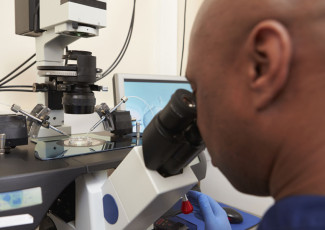Closing the STEM Gap: Creating Pathways from Campus to Tech Careers
By Brent Knight
July 21, 2014
How one Michigan community college prepares students for success in an increasingly high-tech job market.
For the past 10 years, jobs in science, technology, engineering and mathematics (STEM) have grown at a rate three times faster than non-STEM jobs throughout the United States. As community college leaders, one of the most important steps that we can take to help our students connect with jobs after graduation, is to provide them with the appropriate skills and training that fill positions in areas of market growth.
At Lansing Community College (LCC) in Michigan, we have launched a number of initiatives that aim to close the skills gap in STEM and to prepare our students for the jobs of tomorrow:
Military Medic to Paramedic Program (MM2P)
In order to address the unemployment or underemployment of military medics as well as the increasing shortage of registered nurses and EMS personnel, our faculty and staff launched the MM2P program. The first program of its kind in the nation, MM2P helps military medics transition into civilian life through a fast-track path to EMS paramedic certification and licensure. Veterans who complete the program may also enter the Advanced Standing Nursing program to pursue a nursing career.
Get a Skill, Get a Job Program
With the goal of providing students with the necessary skills to work in high-demand, growing occupations, the Get a Skill, Get a Job program includes job readiness workshops, classroom instruction and skill practice. Students sign a learning contract that requires 100 percent attendance, completion of all assigned work, and participation in a job readiness training. Our promise to graduates is to refund the cost of training if, after showing a good faith effort to secure employment, they are unable to secure a job within one year.
Aviation Technology Program
The Aviation Technology program has a rich history and tradition of providing quality aircraft maintenance instruction. Our advanced Aviation Technology Center includes a hangar equipped with classrooms, cutting-edge computer labs and separate bay workstations. Students learn on industry-current machines and technology, and work hands-on with big and small aircraft. Located on an active airstrip, the new center joins the many facilities at LCC that have been expressly designed to ensure student success.
New ‘Stackable Programs’
For student degree completion, it is important to create “stackable programs” that build on one another, integrate with other programs, and lead to associate degrees. For example, our Computer Information Technologies program offers certificates in mobile applications, residential networks and convergence technologies. These particular college certificates also grant industry-recognized credentials that give students the competitive advantage of being job-ready as they complete their education.
Transforming Facilities to Inspire Minds
In 2013, we undertook a broad initiative to transform teaching and learning on campus with the rebuild of our college’s primary classroom and science lab facility, the Arts & Sciences building. Renovations included 16 new science labs and 44 new classrooms. Every square foot of the nearly 50-year-old building was transformed into a learning experience through interactive technologies, flexible designs, and hundreds of displays and artifacts that reinforce how science, math, and art affects our lives. These changes have created a dynamic and adaptable learning environment that meets the expectations of employers, universities and most of all, our students.
The global economy has transformed the nature of opportunity in America. At LCC, we believe it is the role of our nation’s colleges to prepare our students with the skills they need to fill the jobs of today, and participate in the growth industries of tomorrow. By implementing student-centered programs and creating facilities that inspire learning, we can take significant steps toward closing the gap between classrooms and careers while fulfilling students with meaningful academic achievement.














